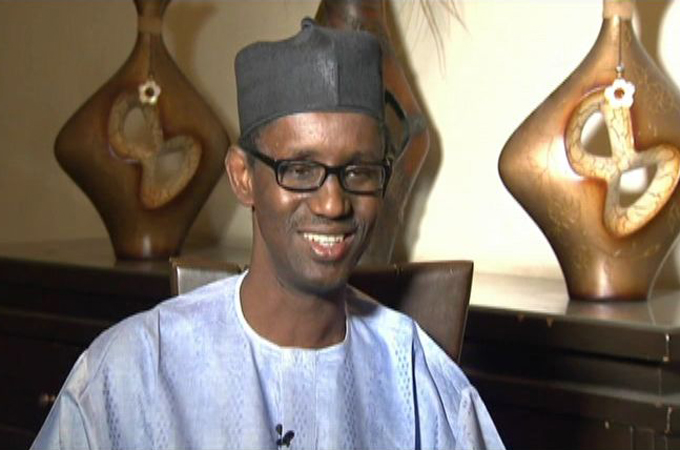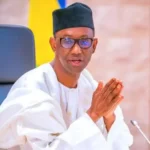At least one newspaper at the time of the official announcement led with a front-page report that said “Stakeholders Worry Over Ribadu’s Appointment as National Security Adviser”. As with such stories in Nigerian journalism where the headline is often very different from the rest of the story, you would struggle to find any relevant “stakeholders” for such a bold claim.
You would think, even expect, that those mentioned as “stakeholders” in the story would be current or former ranking officials of Nigeria’s security agencies like the police, the military and intelligence services, and so on. Instead, they included “a Lagos lawyer” you have most likely never heard about, a “public affairs analyst” and head of an inconsequential NGO, “a communication expert and media executive”, and the like.
How such “sources” become stakeholders on a presidential appointment of a national security adviser, any more than the nearest man in the street, is to be left to the tricks, or rather deficits, of our journalism which easily passes off commentary and opinion as news.
But the headline, and the story, were nevertheless valid in at least one important sense: they reflect a widely shared and expressed view among Nigerians about Malam Nuhu Ribadu’s return to public service as the National Security Adviser (NSA), that is, at the summit of Nigeria’s security and intelligence services reporting directly to the president.
- Bago tasks emirs to safeguard cultural heritage
- Senator Goje flags off distribution of free fertiliser to farmers
Many Nigerians simply have misgivings about Ribadu’s appointment to that role. Some see it as the most problematic of all the appointments President Tinubu has made so far. Even among informed circles, I have heard observations like the job or the “office is too big for him” or that the military and intelligence top brass and their chiefs will find it difficult to “respect”, or “obey” or “take orders” from Ribadu, to cite some of the exact words I have heard over the past two weeks in relation to this issue.
I don’t know if Ribadu himself harbours such fears, and I doubt it, but I find them unfounded. More than that, I think, those who have expressed those fears, with fair and genuine intentions in many cases, simply misunderstand the role itself, or they misunderstand the nature of presidential authority under our current democratic system, or perhaps they underestimate the person and personality of Ribadu himself. Perhaps it is all of these and more.
First, because almost all the NSAs since 1999 have been former or retired generals, there has been a sense that the job of a national security adviser actually requires military experience or skills that only a current or former soldier possesses. This is a false impression. The job of a Nigerian NSA, moulded after the progenitor of the role in the United States, is essentially that of policy development, analysis and advisory on all matters relating to national security.
And where a president has clear ideas about where they intend to go with national security and how to get there, it is simply the NSA’s job to help them get there; no more, no less. The job is not about combat, or even planning or executing wars; though, of course, in the event of a war, it will involve and be about knowing which plans will work best and why, and advising the president on it accordingly. And to that extent, experience in the military would be added advantage but it is not essential.
In the United States, where the first NSA was appointed in 1953, 28 people have since held that role. A clear majority of them have been academics from universities, lawyers and senior government officials. Only a handful of them were former or current servicemen at the time of their appointment. In fact, the current NSA to President Biden, Jake Sullivan, is a 46-year-old policy wonk who previously worked for Obama, Clinton and Biden himself, in addition to having been a visiting professor at Yale Law School. It is simply not a job that requires training in armoury or infantry.
And in any case, while the NSA will traditionally chair security council meetings, in the absence of the president, but ahead of the Chief of Defence Staff and other service chiefs, it does not follow that the NSA has direct line or budget control over the defence departments like the army, the navy or even the police. In other words, the idea that the top service chiefs will “not obey” or “not take orders” from a civilian NSA like Ribadu only displays a misunderstanding of how the role works within a democratic setting.
It is not only that the line of orders from the NSA to the service chiefs is not exactly as it is in the military or the police the way people are thinking, but that the NSA’s commands are, by implication, the president’s commands. After all, in Nigeria’s presidential democracy, all military authority derives directly from the president who is the Commander-in-Chief of the armed forces, and whose own powers, in turn, derive from the constitution as mandated periodically by the Nigerian people in an election.
Accordingly, the president can hire and fire any and all service chiefs at will. And should any service chiefs not wish to take orders from the NSA where such are legitimate, then, it must be understood by all that it is not the NSA who is being disrespected but the president who appointed him to the role. I doubt if any service chief will put himself in such a situation, but should anyone does so, all the president, himself a civilian, needs to do is to fire him and the rest will take a cue from it and learn to respect civilian authority as all soldiers must learn to do in a democracy.
Besides, Ribadu himself is not exactly a “bloody civilian” as we understand the term here. He retired, or was retired, (I don’t know which is which) as an Assistant Inspector-General of Police (AIG) some fifteen years ago. As far as protocols go in the Nigerian security services, that will make him senior to even the most senior of the present crop of service chiefs appointed at the same time as himself.
In Nigeria, the police service is usually counted alongside the army, navy, the air force, the DSS and the national intelligence agency as among the security services, while the Inspector General of Police, at any given time, is considered among the “service chiefs”, even during military governments. In fact, as a measure of this equivalency, if not equality to the military forces, a few police officers were sometimes appointed to the military administrator roles of states, the same way that other military officers were.
Therefore, having been commissioned as an Assistant Superintendent of Police, Nigeria Police Force, on January 1, 1986, he is senior to all the current military and police leaders with whom he will be working on regular basis, all of them at the pleasure of the president.
Finally, rather than see Ribadu as NSA as Tinubu’s weakest appointment so far, it is in my view, a master stroke. The biggest challenges presently facing our security architecture are three: unspeakable corruption at the highest level of the system, the collapse of intelligence gathering and utilisation systems, and the tendency to see the solution to all insecurity as flowing from the barrel of a gun. As Nigeria’s most famous anti-corruption tsar, as a former head to several investigative units in the police, and as a former police prosecutor, I would think that Ribadu possesses the experiences and skills to turn our security misfortunes around. But time will tell.



